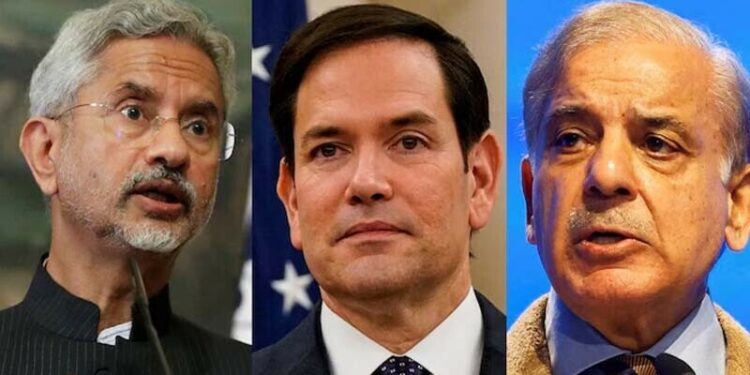In a significant diplomatic development, US Secretary of State Marco Rubio has reached out to Indian Foreign Minister Dr. Subrahmanyam Jaishankar, urging him to reduce the rising tensions in South Asia, particularly in the aftermath of the recent Pahalgam attack. Rubio’s outreach is part of broader US efforts to stabilize the region and promote peace between the nuclear-armed neighbors, India and Pakistan.
High-Level Diplomatic Contact to Reduce South Asian Tensions
According to a statement released by US State Department spokesperson Timmy Bruce, the phone call between Secretary Rubio and Minister Jaishankar focused on maintaining peace and regional security in South Asia. Rubio emphasized that both India and Pakistan must show restraint and work toward de-escalation in order to avoid further deterioration of regional stability.
During the conversation, Secretary Rubio also extended condolences to India over the loss of lives in the Pahalgam attack, describing the incident as tragic and regrettable. He reaffirmed the United States’ commitment to partnering with both India and Pakistan in the fight against terrorism and reiterated the need for constructive dialogue.
US Emphasizes Need for Bilateral Cooperation Between India and Pakistan
Rubio’s call is seen as an attempt to defuse a highly volatile situation that risks spiraling out of control. The US Secretary of State specifically urged Jaishankar to explore avenues for collaboration with Pakistan to ease hostilities, particularly in light of the Indian government’s strong response to the recent attack.
The Biden administration has reiterated that peace and stability in South Asia are essential not only for the region but also for global security. By engaging both parties diplomatically, the United States hopes to avert further escalation and promote conflict resolution through peaceful means.
$130 Million US-India Defense Deal Finalized
In parallel to diplomatic efforts, the United States has also finalized a $130 million defense agreement with India. The deal, approved by the US Defense Security Cooperation Agency (DSCA), includes maritime surveillance software and training programs aimed at enhancing India’s naval capabilities.
According to the DSCA, the sale supports US foreign policy and national security objectives by helping to improve the security of a key strategic partner in the Indo-Pacific region. The agency also clarified that the defense package is not expected to alter the military balance in South Asia, aiming instead to promote stability.
Regional Implications of the Defense Agreement
The announcement of the defense deal comes at a sensitive time, raising questions about the potential implications for regional security. While the US maintains that the agreement is not intended to provoke any country, experts suggest it could contribute to an arms race in South Asia and fuel suspicions in neighboring Pakistan.
Pakistan has historically viewed US-India defense cooperation with skepticism, fearing that it could embolden India’s military posture. However, US officials have repeatedly stated that such deals are focused on enhancing regional security, not stoking tensions.
Pakistan’s Response to the Pahalgam Attack and India’s Provocations
Following the deadly attack on tourists in Pahalgam, India responded with a series of aggressive moves. These include suspending the Indus Water Treaty with Pakistan, ordering Pakistani diplomatic staff to leave India by April 30, 2025, and revoking visas issued to Pakistani nationals. These steps have further strained an already tense bilateral relationship.
In response, Prime Minister Shehbaz Sharif held a phone call with Secretary of State Marco Rubio to present Pakistan’s perspective. During the call, Sharif condemned terrorism in all forms and emphasized Pakistan’s substantial contributions in the global fight against terror—highlighting the country’s sacrifices of over 90,000 lives and economic losses exceeding $152 billion.
Sharif criticized India’s “provocative and inciting behavior,” accusing New Delhi of attempting to distract international attention from Pakistan’s successful counter-terrorism operations, particularly against groups operating from Afghanistan, such as ISIS, ISKP, Tehreek-e-Taliban Pakistan (TTP), and the Baloch Liberation Army (BLA).
Diplomatic and Strategic Moves by Pakistan
In retaliation to India’s diplomatic aggression, Pakistan’s National Security Committee took a series of strategic decisions, limiting India’s diplomatic presence in Islamabad to just 30 officials. The committee also issued a strong warning regarding water security, declaring that any obstruction of water flow from India would be considered an act of war.
Pakistan has also brought the matter to the United Nations, accusing India of orchestrating regional instability. The country has demanded an impartial investigation into the Pahalgam incident and expressed willingness to cooperate in order to uncover the truth.
Global Concerns Over South Asian Tensions
The ongoing hostilities between India and Pakistan—both nuclear-armed states—have triggered global alarm. UN Secretary-General Antonio Guterres has called on both countries to exercise restraint and resume dialogue to resolve their disputes peacefully.
Despite mounting international pressure, India has shown reluctance to soften its stance. Analysts suggest that the Modi government’s hardline position is part of its domestic political strategy ahead of upcoming national elections.
Outlook for Regional Peace and the Role of the US
The current crisis underscores the fragility of peace in South Asia and the crucial role external powers like the United States can play in promoting stability. Through a balanced approach of defense cooperation and diplomatic engagement, the US aims to reduce tensions without appearing to favor one party over the other.
The Biden administration’s dual strategy of strengthening its strategic partnership with India while maintaining open lines of communication with Pakistan reflects a nuanced foreign policy approach. Whether this will be sufficient to restore calm in the region remains to be seen.
Conclusion
The phone calls between US Secretary of State Marco Rubio and the leadership of India and Pakistan signal a proactive diplomatic effort by Washington to manage one of the world’s most dangerous flashpoints. Meanwhile, the approval of a $130 million defense deal with India further highlights America’s strategic interests in the Indo-Pacific.
With tensions continuing to simmer, the next few weeks will be critical. The international community is watching closely, hoping that diplomacy will prevail over confrontation in South Asia.

























